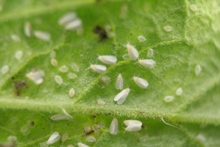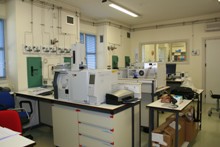Scientific Directorate of PESTICIDES' CONTROL & PHYTOPHARMACY
The Scientific Directorate of Pesticides' Control & Phytopharmacy (SDPC&P) was established in 1977, and the scope of its activities has been continuously enhanced and developed ever since. Today, SDPC&P is a reservoir of knowledge and expertise across all subjects and scientific issues related to the use of pesticides (Plant Protection Products, or PPPs), weed science and Biocidal Products (BPs). Its main objective is the control, research and evaluation of PPPs and BPs in terms of their efficacy, physicochemical properties and safety for humans, animals and the environment. After the incorporation of the Department of Weed Science in the SDPC&P, one of the main objectives of the Scientific Directorate is the development and enrichment of knowledge and technology relevant to the successful management of weed flora in the various crops grown in Greece. These activities follow mainly from BPI’s role as a mandated body for the evaluation of PPPs and BPs at both national and European level. The SDPC&P also conducts a series of assessments related to the use of PPPs after they have been released onto the market, the most important of which are those monitoring residues in agricultural products, and the quality control of authorized PPPs.
The SDPC&P has a unique and dynamic profile. Scientific findings, ideas and expertise are continuously exchanged between researchers, regulatory evaluators and agricultural practitioners. All efforts are focused on ensuring the rational and effective use of PPPs and the use of personal protection measures, according to the rules and criteria governing the most up-to-date approaches to sustainable agriculture and low input crop management (LCM) systems. This is achieved through close cooperation across all scientific disciplines, and continuous and uninterrupted flow of scientific knowledge and expertise between research and practice.
The SDPC&P also implements a large number of research projects related mainly to human, environmental and food safety, maintaining the quality of the natural environment, and the sustainable and safe use of PPPs.
SDPC&P is actively involved in the training of students from affiliated universities. Undergraduates come to the Department to gain practical experience and to implement their final-year projects. Postgraduate students are able to undertake their own research projects, leading to the attainment of MSc and PhD degrees. The Scientific Directorate also trains subject-matter professionals, including farmers, agronomists and analysts.
The scientific activities of the SDPC&P staff extend well beyond the walls of the Institute, thanks to their active participation in scientific groups of international bodies (e.g. European Food Safety Authority, Organisation of Economic Cooperation and Development) and partnerships with research and academic institutes in other countries.
The Laboratory of Pesticide Residues and The Laboratory of Chemical and Toxicological Control of Pesticides have implemented a Quality Assurance System in experimental trials since 2002, and are currently certified by the National Accreditation System (ESYD) in ISO 17025:2005 to conduct a series of experimental tests.
Head of the Scientific Directorate of Pesticides' Control & Phytopharmacy: Aikaterini Kyriakopoulou, PhD, Biologist, Research Director


Dimitra Dourou, PhD, Agronomist
The SDPC & P consists of four laboratories:
Laboratory of Efficacy Control of Pesticides
Laboratory of Pesticide Residues
Laboratory of Chemical Control of Pesticides
Laboratory of Toxicological Control of Pesticides
Laboratory of Environmental Control of Pesticides
Laboratory of Weed Science